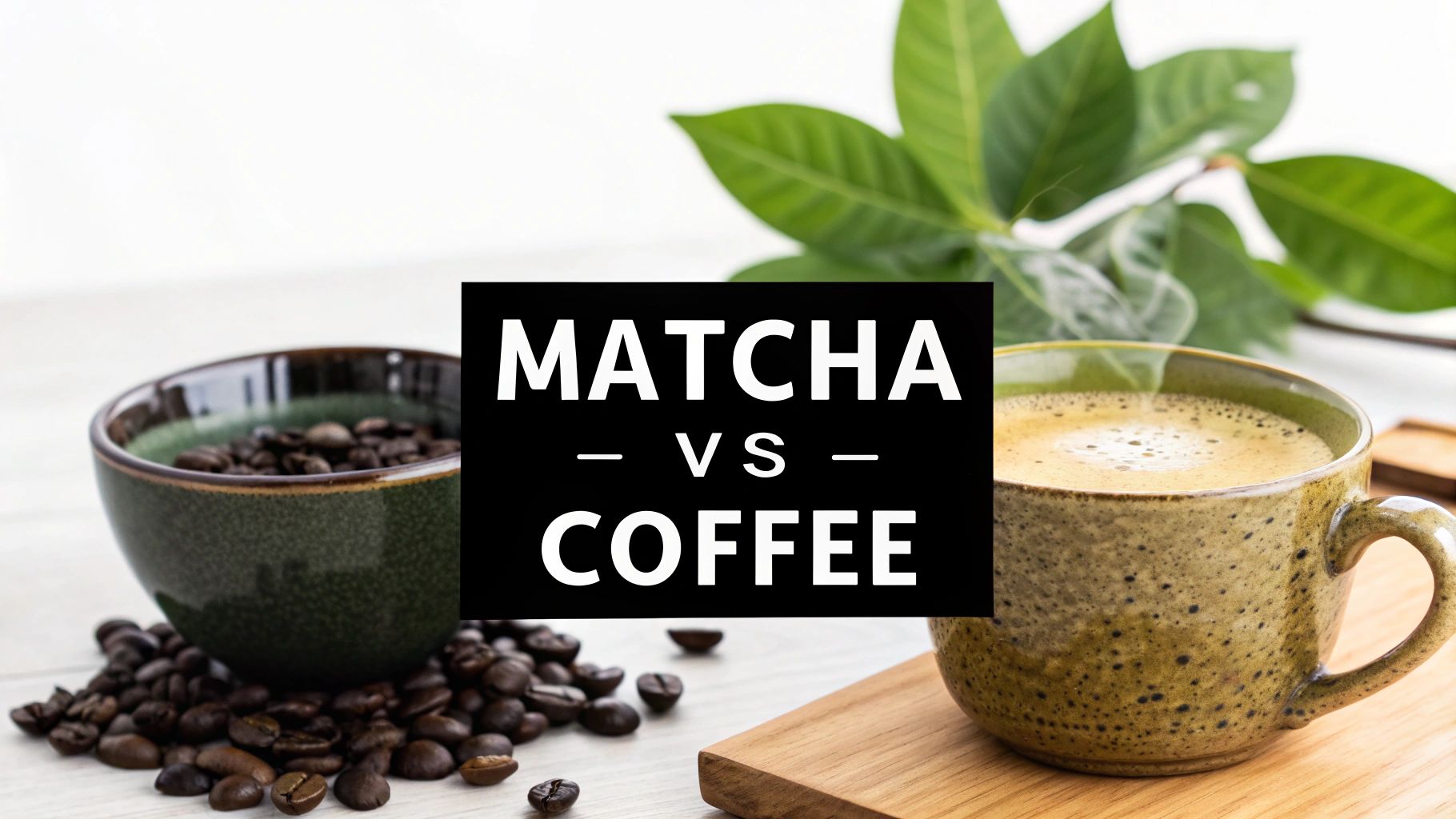At first glance, the ‘matcha caffeine content vs coffee’ debate seems simple. Coffee has more caffeine, so it gives you a bigger energy boost, right? While technically true in terms of milligrams, that’s only a fraction of the story. The real difference lies in how your body uses that caffeine. Matcha delivers a smoother, more sustained lift without the jitters, thanks to its unique synergy with an amino acid called L-theanine. This isn't just a different drink; it's a different kind of energy.
Matcha vs Coffee: The Caffeine Breakdown
When choosing your daily energy source, understanding what separates matcha from coffee is key. This isn't just about the numbers; it's about the entire experience—from the first sip to how you feel hours later. While both are excellent for sharpening your mind, their mechanisms are worlds apart, leading to profoundly different outcomes for your focus and productivity.
For a quick overview, here’s a look at the fundamental distinctions.
Matcha vs Coffee Quick Comparison
| Attribute | Matcha (Amatsu Matcha) | Coffee |
|---|---|---|
| Average Caffeine | 60-80 mg per serving | 95-140 mg per serving |
| Energy Release | Slow and sustained (3-6 hours) | Fast and intense (1-3 hours) |
| Key Compound | L-theanine (promotes calm focus) | Caffeine (primary stimulant) |
| Common Effect | Calm alertness, no crash | Jitters, potential energy crash |
| Acidity Level | Low to neutral | High |
This table clearly shows that while coffee provides a stronger initial caffeine hit, matcha’s effects are designed for endurance, lasting significantly longer.
The chart below puts the caffeine content of matcha and coffee into perspective against the recommended daily limit for a healthy adult.
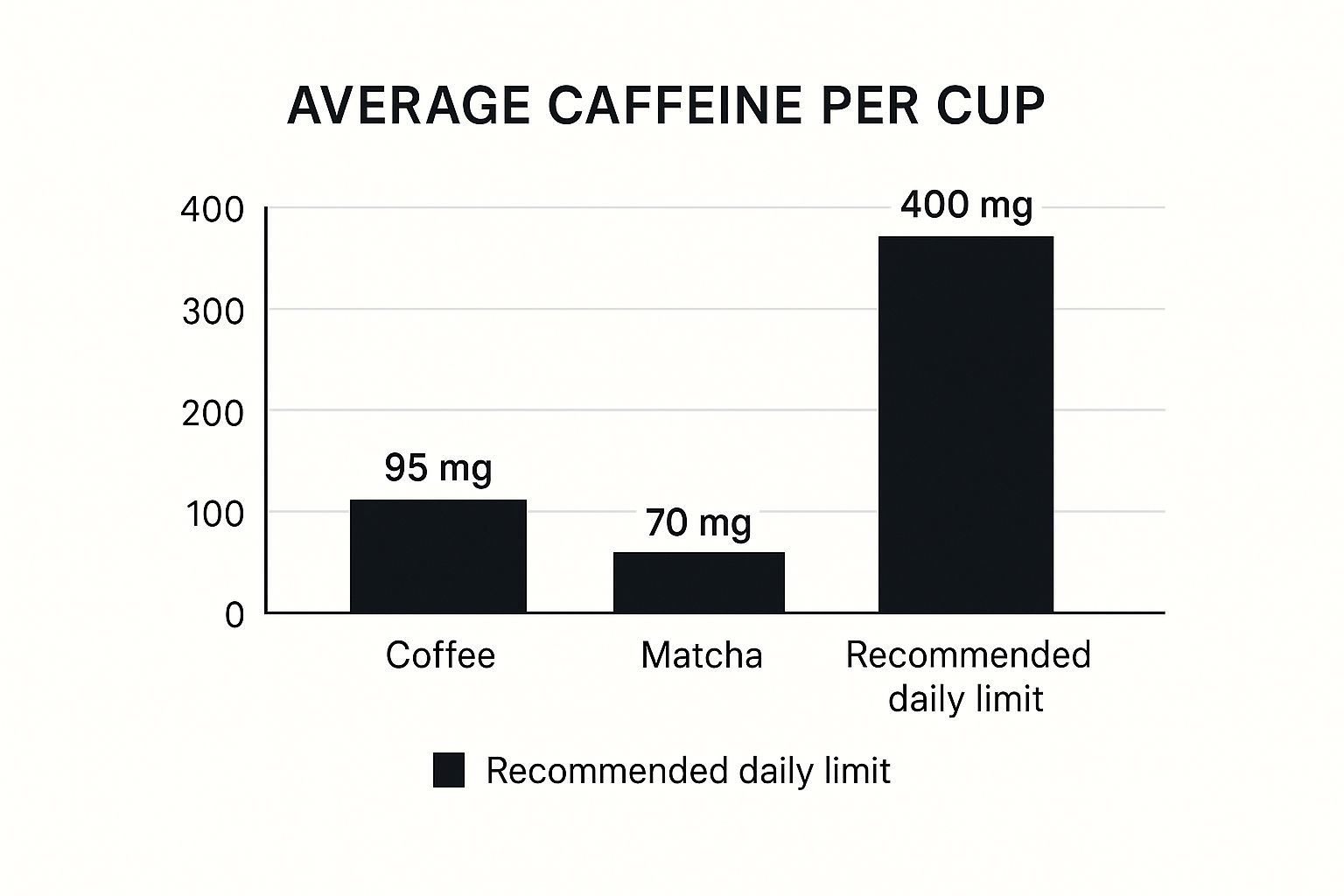
As you can see, both drinks can comfortably fit into a healthy daily routine, but the quality of the energy they provide is what truly sets them apart.
The L-theanine Difference
The secret weapon that elevates matcha is L-theanine. This powerful amino acid is a true game-changer, fostering a state of calm, relaxed alertness that coffee simply can't replicate.
In the UK, a typical cup of matcha contains around 70 mg of caffeine. An average cup of coffee usually has between 100 mg and 140 mg. The L-theanine in matcha slows the body's absorption of caffeine, resulting in long-lasting, crash-free energy. This is the key to avoiding the sharp spikes and dreaded slumps so often associated with coffee.
The presence of L-theanine transforms matcha’s caffeine from a simple stimulant into a tool for focused, stable energy. This is why so many people report feeling productive and clear-headed after drinking matcha, rather than anxious or jittery.
If you're interested in the science behind this balanced energy, our in-depth article on matcha versus coffee caffeine is a great next step. Ultimately, the best choice really comes down to the kind of energy you need to fuel your day.
How Your Body Uses Caffeine from Each Drink
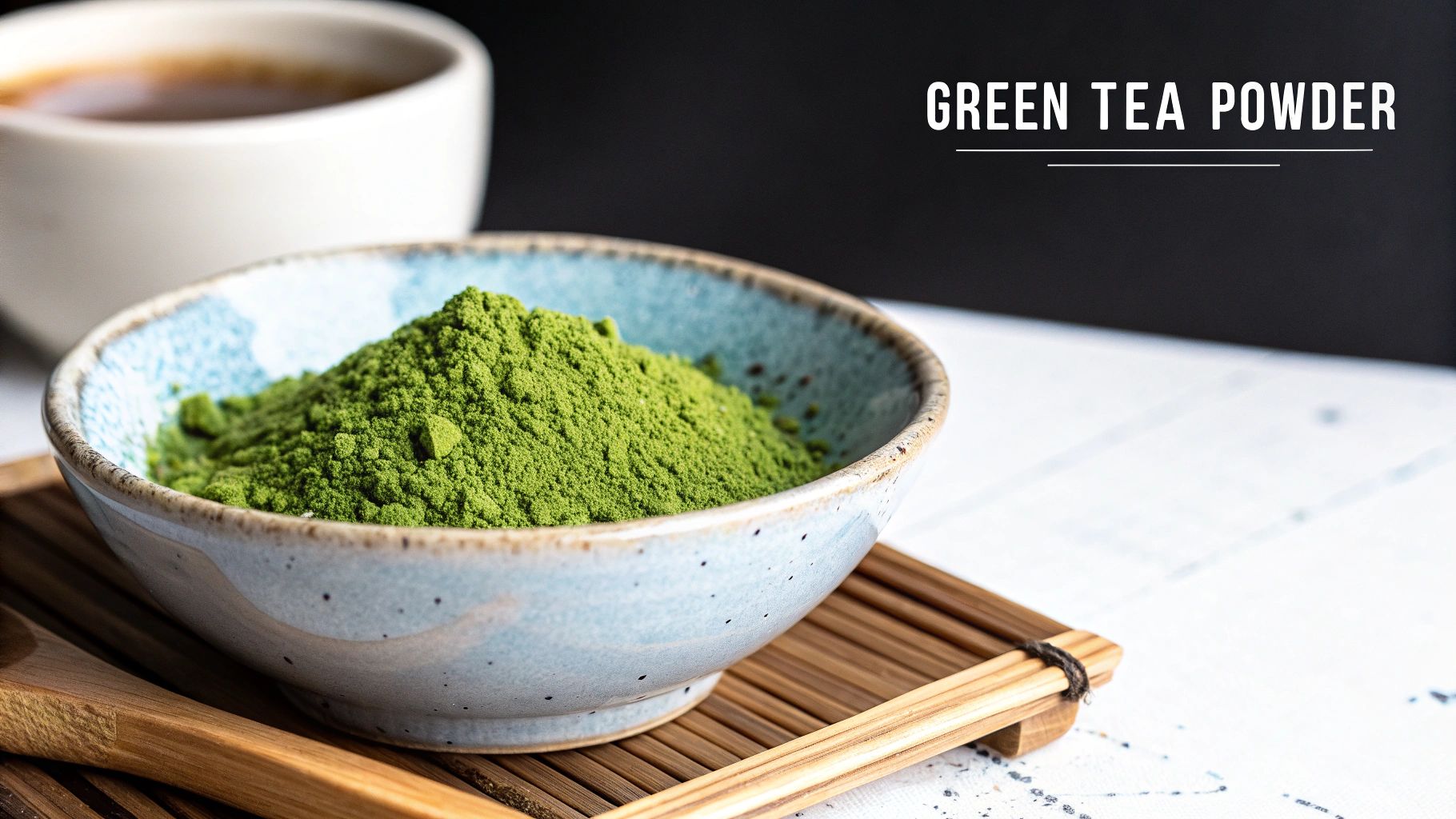
The real difference between how you feel after matcha versus coffee isn't just about the numbers. It's about the biochemical journey. Each drink triggers a unique response in your body, leading to a very distinct kind of energy.
Think of coffee’s caffeine hit as a sprinter. It’s absorbed rapidly into your bloodstream, delivering a powerful, immediate jolt. This is why coffee is so effective at blasting away morning grogginess, but it often comes with a price: the dreaded energy crash a few hours later.
Matcha, in contrast, is the marathon runner. Its caffeine molecules are bound to antioxidants called catechins. This unique structure means your body breaks it down more slowly, resulting in a gradual release of caffeine. This provides a steady, sustained lift that can last for three to six hours without the jarring peak and subsequent plummet.
The L-theanine Synergy
Here’s where matcha truly outshines the competition. It's rich in an incredible amino acid called L-theanine. While caffeine stimulates, L-theanine calms. This dynamic duo creates the state of ‘calm alertness’ that is exclusive to high-quality matcha.
L-theanine crosses the blood-brain barrier and promotes alpha brain waves—the same ones associated with a state of relaxed focus, like you'd experience during meditation or deep creative work.
So, instead of the jittery, anxious energy that a strong coffee can induce, the L-theanine in matcha elegantly smooths out caffeine's sharp edges. It enhances mental clarity and concentration, making it the perfect partner for tasks that require deep, sustained focus.
Comparing the Caffeine Absorption Process
To fully appreciate the difference, let’s compare how your body metabolises caffeine from each source.
- Coffee’s Journey: The caffeine in coffee is 'free' and unbound, leading to near-instant absorption. This causes a quick spike in adrenaline and cortisol, giving you that immediate burst of energy but also paving the way for potential jitters and the inevitable crash as hormone levels drop.
- Matcha’s Journey: Here, the caffeine is bound to catechins and partnered with L-theanine. This synergy slows its release, delivering a gentle, steady stream of energy. Simultaneously, L-theanine promotes relaxation, neatly counteracting any potential negative side effects of caffeine.
This unique synergy is what makes matcha one of the best natural energy drinks for anyone looking to be productive without the physiological stress.
Understanding Caffeine Content Per Serving
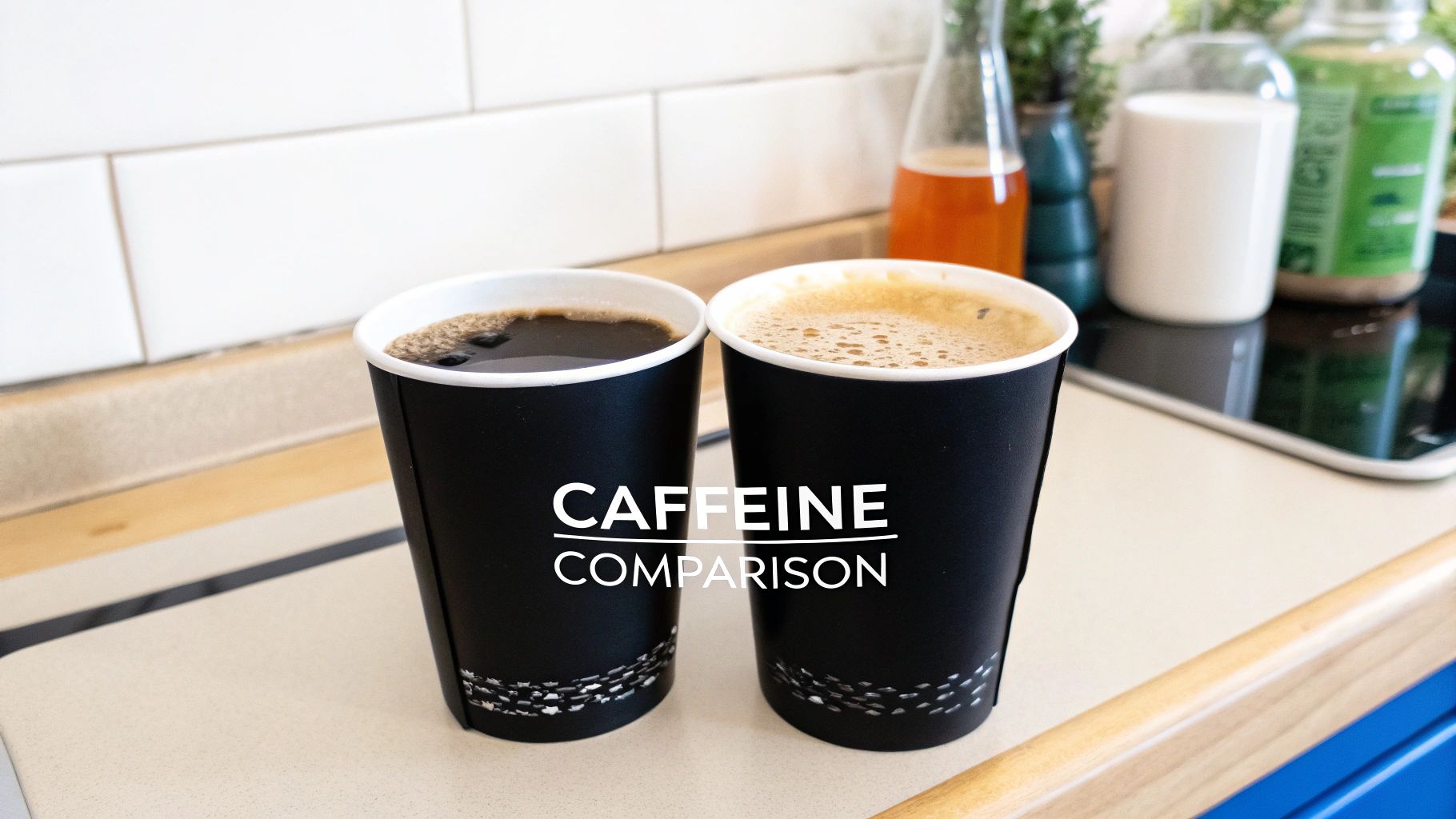
To settle the matcha vs. coffee debate for yourself, it’s important to look beyond averages. The amount of caffeine in your cup is a variable you can control, influenced by preparation methods, serving size, and the quality of the ingredients.
This variability puts you in charge of your energy. Whether you need a gentle morning lift or a powerful afternoon boost, you can tailor your drink to meet your exact needs.
A Data-Driven Comparison of UK Favourites
Let's dig into the numbers for the caffeinated drinks we love here in the UK. A standard serving of matcha is typically prepared with about two grams of powder.
On paper, matcha contains around 32 mg of caffeine per gram. A traditional preparation using two grams of Amatsu Matcha will give you roughly 64 mg of caffeine. Compare that to a typical mug of brewed coffee in the UK, which lands somewhere between 95 to 100 mg. With UK guidelines suggesting a daily limit of 400 mg for adults, one matcha accounts for 15–20% of your daily intake, while a coffee uses up about 25%. You can explore more on these caffeine comparisons and their impact.
While this data shows a clear difference, it's only the start of the story.
The real power lies in knowing how preparation influences the final numbers. A double espresso delivers a concentrated jolt, while a large, milky latte dilutes the caffeine-to-volume ratio. With matcha, you have precise control over every serving.
Factors That Influence Caffeine Levels
A few key factors determine the final caffeine content of your drink. Mastering them gives you ultimate control over your daily ritual.
Here’s what makes the biggest difference:
- Serving Size and Strength: This is the most direct way to manage your intake. Using three grams of Amatsu Matcha instead of the usual two will deliver more caffeine. In the same way, a 'double' shot in your coffee instantly ups its potency.
- Preparation Method: For coffee, the brewing style is a huge factor. A French press or filter coffee, with a longer steep time, tends to extract more caffeine than a quick-pull espresso.
- Ingredient Quality: Not all matcha or coffee is created equal. High-quality, ceremonial-grade matcha like Amatsu Matcha comes from young, shade-grown tea leaves, which are naturally richer in both caffeine and L-theanine. On the coffee side, Robusta beans pack almost double the caffeine of their Arabica cousins.
By understanding these variables, you can shift from passively consuming caffeine to actively curating your energy. It’s about choosing the right fuel for the right task.
Choosing Your Energy for Real-World Scenarios
Knowing the science behind the matcha caffeine content vs coffee is one thing, but applying it to your daily life is where the transformation happens. The best choice depends entirely on your goal. The energy you need for an intense gym session is different from what you require for a marathon study day or a high-stakes presentation.
By matching your drink to your objective, you can enhance your performance and feel your absolute best. It's not about which one is "better," but which is the right tool for you in that moment.
For Intense Focus and Study
Imagine you're cramming for an exam. You need hours of unbroken concentration, free from the jittery anxiety that can sabotage focus. In this scenario, coffee's fast and furious energy burst is a liability, often leading to a hard crash right when you need your brain to be at its peak.
Matcha, on the other hand, is tailor-made for this mental marathon. The slow, steady energy from the caffeine and L-theanine partnership is built for endurance. This synergy creates a state of calm alertness, helping you absorb information and stay sharp for hours without feeling frazzled. For a cognitive edge, our Shrooms blend, with added Lion's Mane, is specifically designed to sharpen focus.
For Calm Confidence in Professional Settings
Now, picture yourself about to walk into a big presentation. The last thing you want is the shaky hands or racing pulse that a strong coffee can trigger. Here, cool-headed clarity and composure are paramount.
This is where matcha truly shines. It sharpens your mind while simultaneously soothing your nerves, giving you the focused confidence to perform under pressure. You’ll feel alert and articulate, but without the nervous buzz that undermines authority.
For Sustained Athletic Performance
For an athlete gearing up for a tough workout, sustained fuel is crucial. While coffee provides an initial jolt, it often lacks the endurance for a long session, and the inevitable energy dip can sabotage recovery. For a closer look at this, check out our full guide on matcha versus coffee as an energy source.
Our Strength blend was created with exactly this in mind. Fortified with creatine, it provides sustained energy that powers you through every rep and set. The slower caffeine release in matcha ensures longer-lasting focus and fewer jitters, giving you a competitive advantage from warm-up to cool-down.
The Amatsu Matcha Advantage
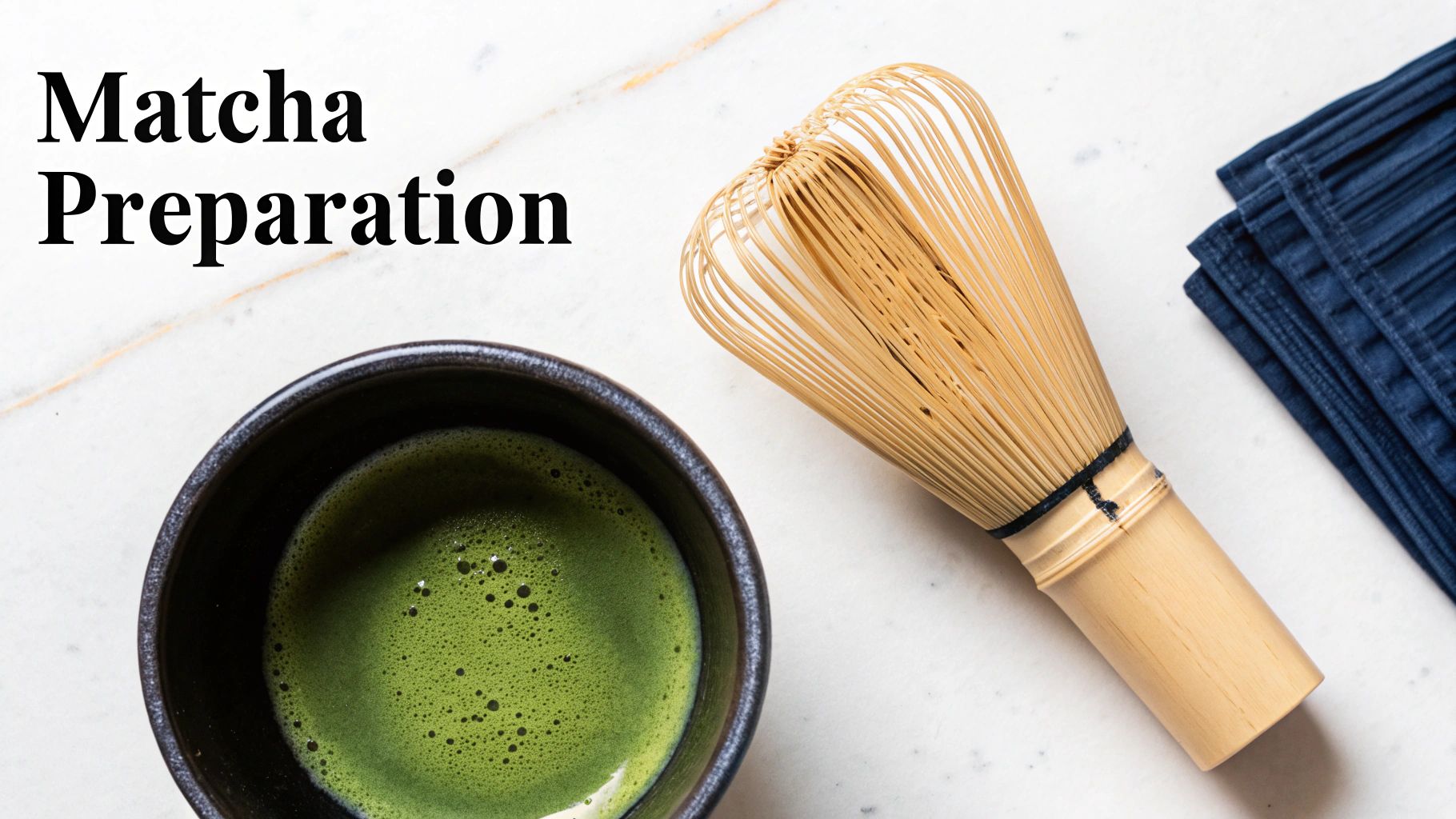
Understanding the theory behind the matcha caffeine content vs coffee debate is important, but experiencing the effects of truly exceptional matcha is transformative. The quality of the powder dictates everything from its flavour and caffeine levels to its health benefits. This is where Amatsu Matcha stands apart.
We source our matcha exclusively from Uji, Japan—the birthplace of this incredible green tea. By using only the finest ceremonial-grade, first-harvest leaves, we guarantee a product with a vibrant colour, a smooth texture, and a rich umami flavour free from bitterness. This isn't just a beverage; it's an investment in your well-being.
Blends Designed for Your Life
We believe that energy should be functional. That’s why we’ve developed a range of targeted blends, each crafted to support a specific aspect of your daily life.
- Pure: For the purist. Our classic ceremonial-grade matcha delivers daily wellness and that signature mindful energy.
- Radiance: Infused with marine collagen to support vibrant skin, hair, and nails from within.
- Shrooms: Boosted with adaptogenic mushrooms like Lion's Mane to sharpen focus and elevate cognitive function.
- Strength: Fortified with creatine, this blend is engineered to enhance physical performance and accelerate muscle recovery.
Each Amatsu blend starts with the calm, sustained energy of our premium matcha and layers in powerful, targeted ingredients. This means you’re getting more than just an energy lift—you’re getting a functional boost perfectly aligned with your personal goals.
Choosing Amatsu is about choosing intentional wellness and uncompromising quality. We’re committed to providing the best matcha in the UK, a genuine partner for your journey towards balanced energy and vitality.
Got Questions About Matcha and Caffeine? We've Got Answers.
We've delved deep into the matcha vs coffee debate, but you might still have a few lingering questions. Let's clear them up so you can feel completely confident about making the switch.
"Coffee makes me jittery. Can I still drink matcha?"
Yes, absolutely. In fact, this is one of the top reasons people are converting to matcha. The infamous coffee jitters are caused by a rapid spike in caffeine and adrenaline.
Matcha works differently. It contains the amino acid L-theanine, which works in harmony with caffeine. This compound induces a sense of calm and relaxation, smoothing out the caffeine's stimulating effects. The result is ‘calm alertness’—you get all the focus without the anxious buzz, making it the perfect alternative if you're sensitive to coffee.
"How much matcha can I safely drink each day?"
For most healthy adults, 2-3 servings of matcha a day is a great sweet spot. A typical serving is about one teaspoon (or two grams) of matcha powder, which delivers a balanced, effective dose of caffeine.
Of course, the best advice is always to listen to your body. If you’re just starting your matcha journey, begin with one cup and see how you feel. You might find that the sustained energy from a high-quality matcha like Amatsu's lasts so long that one cup is all you need to power through your day.
"Will matcha stain my teeth the way coffee does?"
Good question. Coffee is highly acidic and packed with tannins, which are notorious for staining teeth. Matcha, on the other hand, is much less acidic. Even better, its catechins (a powerful type of antioxidant) may actually support your oral health by inhibiting certain bacteria.
While any coloured drink can cause some discolouration over time, matcha is far less likely to stain your teeth than a daily coffee habit. A simple rinse with water after your matcha can help keep your smile bright.
"What’s the best way to prepare Amatsu Matcha?"
Preparing your first bowl of Amatsu Matcha is a simple, mindful ritual. You don't need fancy equipment to get started.
- Sift one teaspoon of matcha powder into a bowl to remove any clumps.
- Add about 60ml of hot water—aim for around 80°C, not boiling, to protect the delicate nutrients.
- Whisk vigorously in a zigzag motion until a fine, creamy froth appears on the surface.
- Top it up with more hot water or your favourite steamed milk to enjoy.
Want to explore this topic further? For a deeper dive into making the perfect choice for your energy needs, explore our detailed guide on what’s better for clean energy and wellness.
Ready to upgrade your energy and experience a calmer, more focused state of mind? Explore the full range of functional blends from Amatsu Matcha and find your perfect daily ritual at https://amatsumatcha.com.
Read more
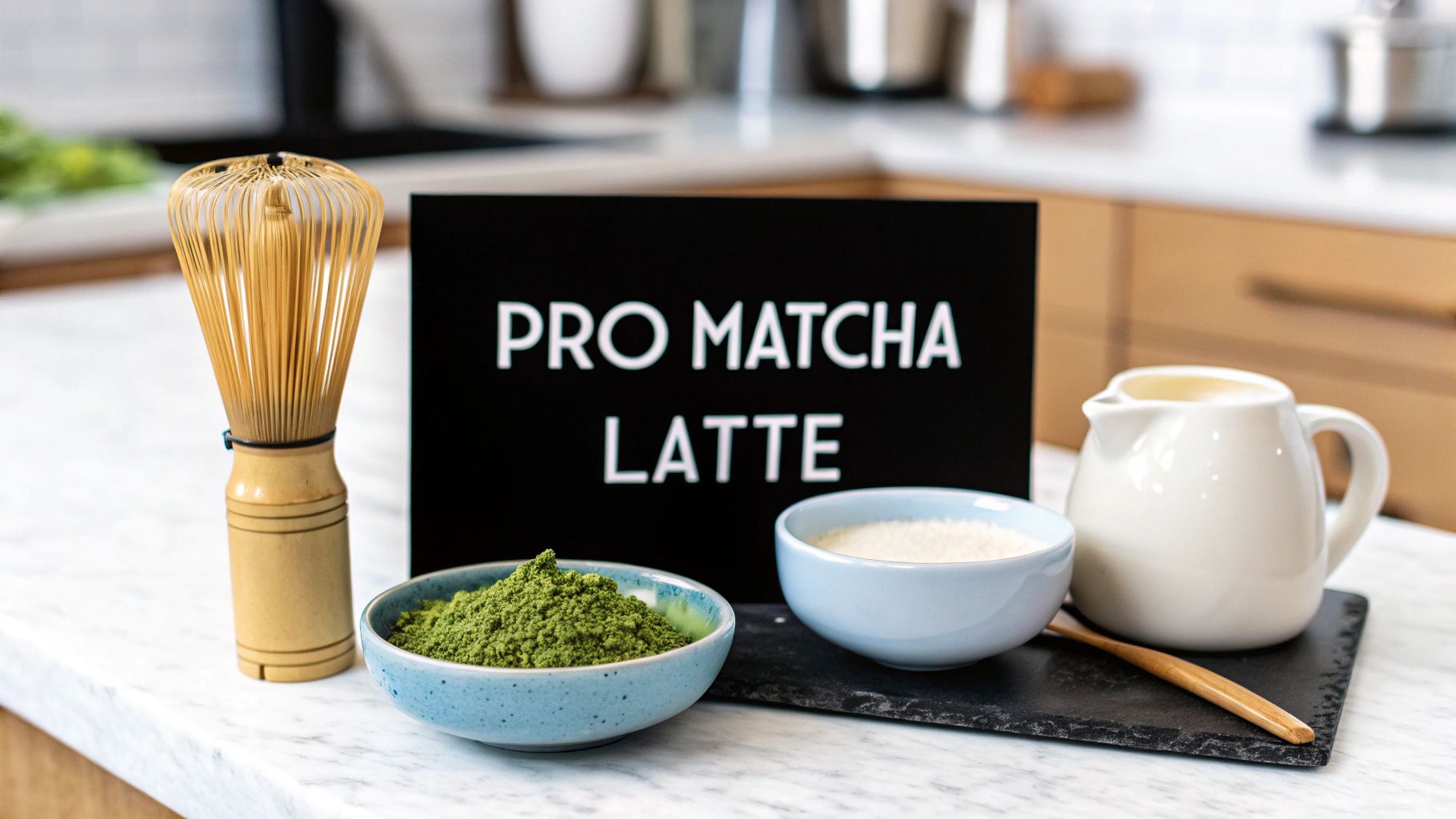
Learn how to make matcha latte with this easy guide. Get pro tips, choose the right matcha, and craft a café-quality drink in your own kitchen.
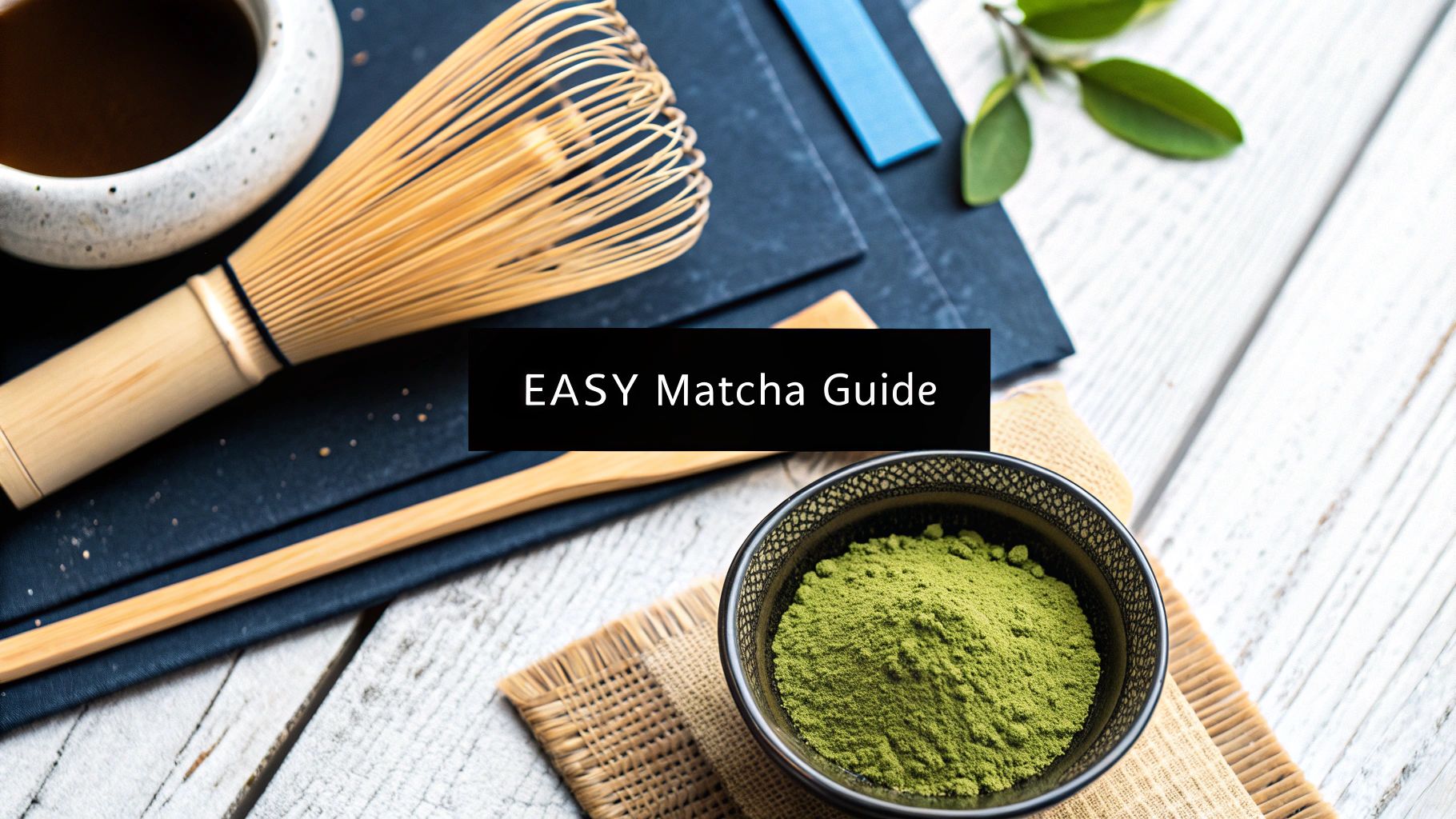
Learn how to make matcha tea at home with our simple, foolproof guide. Perfect for beginners and matcha lovers alike. Start brewing now!
